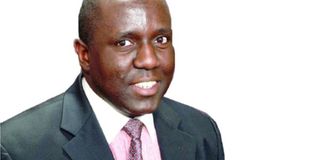2016, the year of the juju or medicine man

Mr Ssemogerere is an Attorney-at-Law and an Advocate.
What you need to know:
- Another growing branch of this industry are medicine men, distinct who use these so-called powers to “treat” illnesses.
- The major religions have had very little impact on this new trend of “okusamira” or “devil-worship”.
Literature on world religions lumps traditional beliefs in Africa as either African traditional religions for academic purposes or animism as a category compared to the major world religions. Major world religions are dominated by monotheistic religions, Islam and Judeo Christianity. Hinduism is a major world religion by a number of adherents but practiced nearly exclusively by Indians or persons of Indian descent. Culturally, Islam and Judeo Christianity are essentially a continuum of Arab-Jewish culture whose differences are minor that have each found themselves at the helm of Arab and Western civilisation.
The fate of African traditional religion until as recently as two decades ago was mostly as a relic of the past that would die away quietly. In Uganda, it was looked down upon as comprising of “primitive practices of the past.” When former vice president Gilbert Baalibaseka Bukenya visited a medicine man’s shrine in Burinzi, the birthplace of Catholic martyr Karoli Lwanga in the plains of Eastern Buddu county in Bukoto West, this was seen as a major blot on his public image as he squeezed himself out of a grass thatched hut. Burinzi is now in the public eye again as it is now resident to a minor (but large by our standards) enterprise that seeks to tap water from one of the shallow lakes, Lake Burinzi for irrigation a few kilometers from the Ssunga-Bukkakata junction. As most of the other economic activity dissipated over the years, the once hidden shrines in Burinzi have grown in size and stature and so have many others all over the country.
In 2016, the medicine men and women in Buganda endorsed the candidature of incumbent Yoweri Museveni during the presidential election. The president has intimated that during the bush war, the opinions of these people were important in opining on the guerrilla war effort. If one doubted this stature, the phone call by Maama Fiina (Sylvia) Namutebi to the President after the murder execution of her husband Major Kiggundu laid any doubts to rest.
In the last 20 years, these gods of convenience have become a major have to item similar to a modern convenience like a cellphone. Press pictures of the Omusinga of Rwenzururu Charles Wesley Mumbere in a state of partial undress revealed he adorns his body with fetishes associated with lucky charms. Fetishes and other charms are associated with supernatural powers and routinely demand various forms of sacrifices including money and animals, - the history behind the lingua “animism”.
Another growing branch of this industry are medicine men, distinct who use these so-called powers to “treat” illnesses.
In the villages, these people have set up growing medical practices to fill a void in the health sector treating otherwise preventable diseases or others that can be managed like mental health and HIV/Aids. During the first days of Aids, medicine men thrived on all sorts of concoctions which had little to do with treating this grave condition. The rich and the poor ply the roads to get to these miraculous treatments most of which are nothing but placebo concoctions.
The extreme variations of these groups engage in practices like human sacrifices common in many parts of the country. In Teso, a major human trafficking ring has been on and off under wraps. Child kidnapping especially of young uncircumcised boys has been reported in the past. Milder forms “admit” patients for lengthy tenures without any supervision and no data is recorded on deaths while under “treatment”. The modern shrine sits in well-appointed neighbourhoods and has long overcome the discretion.
The major religions have had very little impact on this new trend of “okusamira” or “devil-worship”. They are caught up in the materialism associated with the acquisitive consumer culture. Most of the churchgoers do maintain the dual loyalty to both established religions and African traditional religions. In the Maj Kiggundu-Maama Fiina marriage, we saw the blending of the two worlds, a Muslim cleric and famous medicine woman.
Mr Ssemogerere is an Attorney-at-Law and an Advocate. [email protected]




